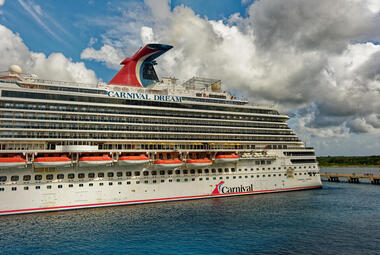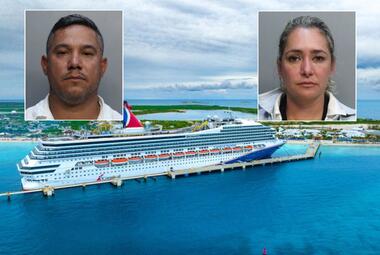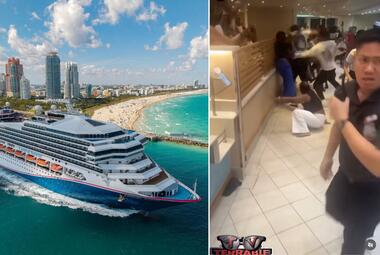Criminals are targeting cruise-goers in a recent wave of scams, often using information shared by travelers on social media.
Within the last year, cruisers are sharing how they’ve fallen victim to scammers. As with most scammers, the criminals are becoming more creative and believable. These criminals are not only stealing money from vacationers by posing as the cruise line, but also canceling their cruises. Experts are emphasizing that cruisers should refrain from sharing little to no booking information online for their upcoming cruise to prevent being the target of potential scammers.
One woman, Brittany Paine, shared with NBC 4 in Los Angeles how she was the victim of a recent scam with her upcoming Carnival cruise reservation. The mom of four had booked her cruise more than one year prior for her and her kids to sail over Mother’s Day. The cruise itinerary was a quick weekend sailing to Ensenada, Mexico. Even still, the family was very excited for their vacation.
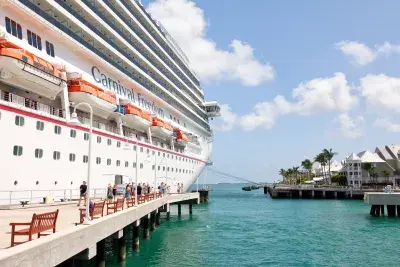
A few days before the cruise, Paine claims she received an email with a stateroom upgrade offer. The email appeared to be from Carnival Cruise Line. Curious about the upgrade offer, Paine took action. When she called the number provided in the email, the representative told her that her cruise had an outstanding balance.
In an interview with NBC 4 Los Angeles, Paine said the scammers told her, “We noticed here that you have an outstanding balance on your upcoming cruise for $294, and you will not be able to board if that’s not taken care of.”
Not wanting to jeopardize her Mother’s Day vacation, Paine paid the $294 fee over the phone. She also provided her booking number to the person on the other end of the line. The person on the phone told her this charge was for a “deck fee” that was left unpaid on her upcoming cruise reservation.

(Brittany Paine in her interview with NBC 4 Los Angeles)
Feeling unsettled and suspicious by the experience, Paine hung up and called a different number she found online for Carnival Cruise Line. This is when she realized she had been scammed. When the Carnival representative looked at her reservation, she said there was no outstanding balance for her upcoming cruise. Moreover, the cruise line doesn’t charge any sort of “deck fee.”
Paine told NBC 4 Los Angeles, “She said, ‘No, ma’am, that was a scam. We wouldn’t have charged you a deck fee. Go ahead, and dispute that with your bank.’”
Taking the advice of the Carnival representative, Paine disputed the charge with her bank. Luckily, her bank refunded her the scammer’s $294 “deck fee” charge. Paine realized the number she called from that first “upgrade offer” email was fraudulent. Unfortunately, this wasn’t the end of the saga for Paine.
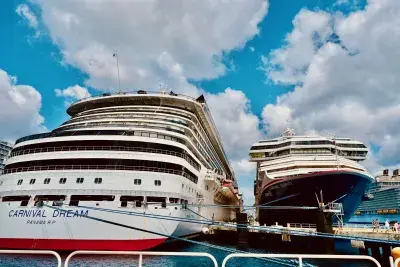
Paine says after the ordeal, she received an email from Carnival Cruise Line that her cruise was canceled a few days before her sailing. Her heart sank. She called Carnival Cruise Line once again to figure out what had happened. Sadly, the cruise line confirmed it was true that her cruise had been canceled by someone with access to their reservation.
This is when Paine learned that someone had accessed her booking. The cruise line said someone must have canceled her cruise, although Paine still doesn’t know how this could have happened. Paine said she could not confirm the scammers were behind the cancelation, but revealed she did share her booking information with the scammers while paying the “deck fee.”

(Brittany Paine in her interview with NBC 4 Los Angeles)
Regardless, her cruise was canceled and the change could not be reverted. Carnival Cruise Line said Paine would be charged $900 for the last-minute cancelation - per the cruise line’s cancelation policy. Even worse, the ship was now sold out so Paine and her family wouldn’t be able to sail to Ensenada as planned for Mother's Day. She was left heartbroken and frustrated.
Paine told NBC 4 Los Angeles she originally had to take out a loan to afford the cruise. She was only able to afford the trip by making scheduled payments towards the final balance - and she couldn’t come up with $900 more for her to take her kids on another cruise anytime soon.
“It was a lot of money for me,” she told the news station. However, the mother was eventually refunded the $900 cancelation charge from the cruise line after the ordeal was publicized.
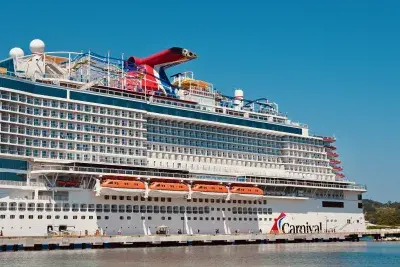
Experts say that cruisers should share as little information online as possible about their cruises, especially booking numbers. Criminals can do virtually anything with your cruise if they obtain your booking number. However, Paine never posted her booking information online, she only fell victim to the fraudulent email. By providing her booking number to the scammer over the phone, the criminals are likely to blame for the cruise cancelation.
Paine is hoping to cruise with her family next summer, although the ordeal has left her disheartened. "Nobody is safe from these scams. And they get better and better,” she said in her interview with NBC 4 Los Angeles.
Even still, this isn’t the first time a cruiser has been the target of a scammer. A few months ago, one family found their $15,000 Carnival cruise had been unexpectedly canceled after one of the guests had shared their booking information on social media. The family had booked an Excel Presidential Suite - one of the most expensive cabins onboard Carnival’s ships - over one year earlier.
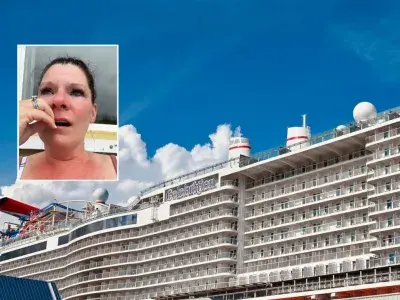
Tiffany Banks, a naturopathic doctor, said her husband accidentally shared their cruise booking information on Facebook. This eventually provided criminals access to the family’s reservation for their pricey vacation. The scammer canceled the family’s long-awaited cruise only two days before they were scheduled to set sail.
In a series of heartbreaking TikTok videos, Banks shares with her followers the unfortunate incident and how it transpired. First, she shared that she received confirmation of her Carnival cruise getting canceled. But, Banks had never canceled her cruise, nor did she intend to. The cruise line eventually discovered that an unauthorized person accessed her booking and canceled the reservation.
In these situations, scammers will often try to then contact the victim, posing as the cruise line. When victims realize their booking has actually been canceled, the scammers then ask for money to reinstate the booking. Of course, the scammers then pocket the cash from the scheme. Experts suggest if you receive an email or phone call from the supposed cruise line that you should call the number provided online to confirm any changes or charges.
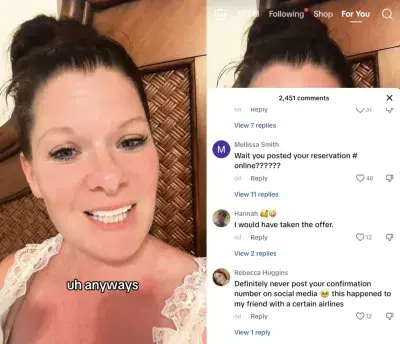
Although Banks alleges that Carnival offered two interior cabins to the family as a gesture of goodwill, they felt this was insufficient given the $15,000 already spent on the cruise. The family decided to travel to Miami anyway, where they were denied boarding without an appropriate reservation for their cruise. The family watched as their Carnival cruise ship sailed off into the horizon without them. They were also denied a refund initially per Carnival’s same last-minute cancelation policy.
Later, Banks says the cruise line reached back out to confirm the reservation had been canceled by a scammer with access to their reservation. Banks and her husband feel they were victims of identity fraud; however, Carnival Cruise Line blames the sharing of their booking number in a photo on Facebook.
The only information provided by the cruise line to Banks and her family was that the scammer accessed their account from an IP address in British Columbia. A scammer was likely able to create a new profile and link the booking number that was shared online. Other than that, the cruise line couldn’t do much more for the family.

Speaking on the family’s incident, a spokesperson from Carnival told PEOPLE, "Unfortunately, this guest failed to heed well-documented and very common travel safety and security advice.”
“It is never a good idea to post personal information about your travel plans, including a confirmation number for a booking, which could allow a bad actor or identity thief to use that information in inappropriate or even illegal ways,” continued the spokesperson.
In this way, travelers should never share booking numbers, passport information, or other personal documentation online.
The Banks family was offered more than $10,000 in cruise credits by Carnival Cruise Line to rectify the situation. Banks claims the cruise credit was contingent on the family publicly acknowledging that the situation had been resolved with Carnival. Regardless, Banks said her and her family have no interest in cruising again after the scam.




